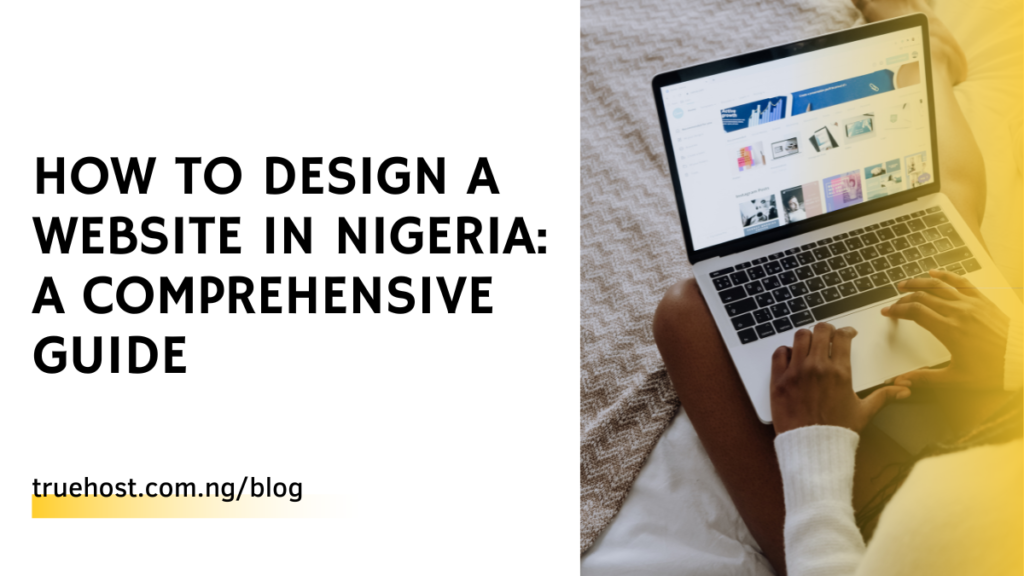<p>So you&#8217;re ready to take your business online and create a stunning website that will attract customers from all corners of Nigeria? </p>



<p>Well, you&#8217;ve come to the right place! </p>



<p>Designing a website may seem like a daunting task, but fear not, because this comprehensive guide is here to demystify the process for you. </p>



<p>Whether you&#8217;re an aspiring entrepreneur or an established business owner looking to revamp your online presence, we&#8217;ll walk you through everything you need to know about designing a website in Nigeria. </p>



<p>From choosing the perfect domain name to selecting eye-catching templates and optimizing for mobile devices, we&#8217;ve got all the tips and tricks to ensure your website stands out in this digital age. </p>



<p>So grab a cup of tea (or maybe some Nigerian palm wine) and let&#8217;s dive into the wonderful world of web design!</p>



<h2 class="wp-block-heading"><strong>The Boom of Online Shopping in Nigeria</strong></h2>



<p><a href="https://www.statista.com/topics/6786/e-commerce-in-nigeria/" target="_blank" rel="noreferrer noopener">With approximately 76.7 million online buyers in 2020,</a> out of a total population of 206 million, online shopping is on the rise in Nigeria. This surge can be attributed to the fact that 89% of internet users in Nigeria already make purchases online, with an additional 24% planning to join the online shopping bandwagon soon. </p>



<p>This shift towards online retail is further amplified by the fact that Nigerian consumers are embracing both local and foreign online stores, making them among the world&#8217;s most enthusiastic mobile shoppers.</p>



<p>As if these figures weren&#8217;t convincing enough, the Nigerian e-commerce market is expected to witness a Compound Annual Growth Rate (CAGR) of 12.24% between 2022 and 2027. </p>



<p>This all points to a thriving online marketplace, making it an opportune time for businesses to establish their digital presence.</p>



<h2 class="wp-block-heading"><strong>Why Your Business Needs a Website</strong></h2>



<p>In an era where the virtual world often dictates the success of businesses, having a website has transitioned from being a luxury to a necessity. </p>



<p>Here are compelling reasons why your business, regardless of its size or industry, needs a website:</p>



<h3 class="wp-block-heading"><strong>1. Establishing a Professional Online Presence</strong></h3>



<p>A website serves as your digital storefront, offering the first impression to potential customers. </p>



<p>An aesthetically pleasing and informative website can instantly make your business appear credible and professional, influencing potential customers&#8217; decisions in your favor.</p>



<h3 class="wp-block-heading"><strong>2. Reaching a Wider Audience</strong></h3>



<p>Unlike a physical store with geographical limitations, a website can be accessed by people globally, around the clock. This unparalleled accessibility enables you to tap into a vast, diverse audience that a brick-and-mortar establishment can&#8217;t match.</p>



<h3 class="wp-block-heading"><strong>3. Generating Leads and Sales</strong></h3>



<p>Your website can be a powerful tool for lead generation and sales. By providing information about your products or services and making it easy for customers to contact you, your website becomes a 24/7 sales representative working to attract and convert potential customers.</p>



<h3 class="wp-block-heading"><strong>4. Providing Customer Service</strong></h3>



<p>Websites can serve as a hub for customer service, addressing frequently asked questions, offering support documentation, and providing avenues for customers to voice their concerns. This contributes to customer satisfaction and loyalty.</p>



<h3 class="wp-block-heading"><strong>5. Building Your Brand</strong></h3>



<p>A well-designed website helps solidify your brand identity and industry authority. Sharing your company&#8217;s story, values, and mission on your website helps create a connection with your audience, fostering trust and loyalty.</p>



<h2 class="wp-block-heading"><strong>Steps to Designing a Website in Nigeria</strong></h2>



<p>Designing a website in Nigeria involves several key steps, each crucial to the overall success of your online presence. Here&#8217;s a detailed breakdown of each step:</p>



<h3 class="wp-block-heading"><strong>1. Choosing a Website Platform</strong></h3>



<p>Selecting the right website platform is the foundation of your online venture. Platforms like WordPress, Wix, and Shopify offer different levels of customization and functionality. When choosing, consider your website&#8217;s purpose, your budget, and your technical skills.</p>



<h3 class="wp-block-heading"><strong>2. Buying Domain and Hosting</strong></h3>



<p>A domain name is your website&#8217;s address, while hosting provides the server space for your website&#8217;s content. Choosing a domain that&#8217;s relevant, easy to remember, and unique is essential. Similarly, selecting a reliable hosting provider ensures your website&#8217;s speed, security, and uptime.</p>



<div class="wp-block-buttons is-layout-flex wp-block-buttons-is-layout-flex">
<div class="wp-block-button"><a class="wp-block-button__link" href="https://truehost.com.ng/webhosting-in-nigeria/" target="_blank" rel="noreferrer noopener">CHEAP DOMAIN &; HOSTING!</a></div>
</div>



<h3 class="wp-block-heading"><strong>3. Installing WordPress</strong></h3>



<p><a href="https://wordpress.org/40-percent-of-web/#:~:text=%E2%8C%83-,WordPress%20Powers%2040%25%20of%20The%20Web,is%20even%20higher%20at%2051.8%25." target="_blank" rel="noreferrer noopener">WordPress, powering over 40% of all websites globally</a>, is a popular choice due to its user-friendly interface and vast customization options. To set up WordPress, follow the steps of downloading, configuring, and installing the platform on your chosen hosting server.</p>



<h3 class="wp-block-heading"><strong>4. Designing Your Website</strong></h3>



<p>Website design involves creating a visually appealing layout that aligns with your brand. Select a theme, create a logo, choose colors and fonts, and organize your content. Ensure your design is mobile-responsive, as a large portion of online shopping in Nigeria is conducted on mobile devices.</p>



<h3 class="wp-block-heading"><strong>5. Developing Your Website for E-commerce</strong></h3>



<p>If your goal is to <a href="https://truehost.com.ng/products-to-sell-online-in-nigeria/" target="_blank" rel="noreferrer noopener">sell products or services online</a> in Nigeria, you&#8217;ll need to optimize your website for e-commerce. <a href="https://truehost.com.ng/payment-gateways-for-shopify-in-nigeria/" target="_blank" rel="noreferrer noopener">Set up secure payment gateways</a>, create enticing product pages, incorporate a shopping cart, and ensure compliance with data protection regulations.</p>



<h2 class="wp-block-heading"><strong>Essential Elements of Website Design</strong></h2>



<p>A well-designed website incorporates key elements that enhance user experience and engagement:</p>



<h3 class="wp-block-heading"><strong>1. Navigation</strong></h3>



<p>Intuitive navigation is crucial for helping users find what they need easily. A well-structured menu and clear categorization can guide users seamlessly through your website.</p>



<h3 class="wp-block-heading"><strong>2. Visual Design</strong></h3>



<p>Visual aesthetics matter. A harmonious color scheme, appealing typography, and carefully chosen images contribute to the overall user experience.</p>



<h3 class="wp-block-heading"><strong>3. Content</strong></h3>



<p>Compelling, well-organized content is the heart of your website. Engaging copy, high-quality images, and informative videos keep visitors interested and informed.</p>



<h3 class="wp-block-heading"><strong>4. Web-Friendly Features</strong></h3>



<p>Optimize your website for browsers and devices, use SEO-friendly meta and alt tags, and ensure accessibility for users with disabilities.</p>



<h3 class="wp-block-heading"><strong>5. Interaction</strong></h3>



<p>Engage users through interactive elements such as buttons, forms, and sliders. These elements facilitate engagement and encourage users to take desired actions.</p>



<h3 class="wp-block-heading"><strong>6. Information Accessibility</strong></h3>



<p>Clear headings, subheadings, and labels make it easy for users to navigate and find the information they&#8217;re seeking. A search function and sitemap further enhance accessibility.</p>



<h3 class="wp-block-heading"><strong>7. Intuitiveness</strong></h3>



<p>An intuitive design simplifies user navigation and ensures visitors can easily explore your website without feeling lost or overwhelmed.</p>



<h3 class="wp-block-heading"><strong>8. Branding</strong></h3>



<p>Consistent use of logos, colors, and other brand elements strengthens brand recognition and establishes trust with users.</p>



<h3 class="wp-block-heading"><strong>9. User Experience (UX)</strong></h3>



<p>Prioritize user experience by providing a smooth, enjoyable journey through your website. Clear layouts and easy navigation contribute to positive impressions and conversions.</p>



<h2 class="wp-block-heading"><strong>Must-Have Plugins for Your WordPress Website</strong></h2>



<p>When building your website on the WordPress platform, these plugins can enhance its functionality and performance:</p>



<ol class="wp-block-list"><li><strong>Yoast SEO</strong>: Optimize your website for search engines, enhancing your visibility and ranking.</li><li><strong>UpdraftPlus</strong>: Ensure your website&#8217;s safety with regular backups and restoration options.</li><li><strong>WP Rocket</strong>: Improve your site&#8217;s speed and performance through effective caching.</li><li><strong>Elementor</strong>: Create custom page layouts and designs without coding.</li><li><strong>WPForms</strong>: Develop interactive forms for user engagement and data collection.</li><li><strong>Jetpack</strong>: Enhance security, performance, and analytics for your website.</li><li><strong>All in One SEO</strong>: Another SEO tool offering optimization features for improved search engine ranking.</li><li><strong>Smush</strong>: Optimize images for faster loading times without compromising quality.</li><li><strong>WooCommerce</strong>: If your site involves e-commerce, this plugin facilitates online store management.</li><li><strong>HubSpot</strong>: Enable effective marketing strategies through lead generation, email marketing, and analytics.</li></ol>



<h2 class="wp-block-heading"><strong>Top Web Design Companies in Nigeria</strong></h2>



<p>If you&#8217;re considering hiring professionals to design your website, here are some reputable web design companies in Nigeria:</p>



<ol class="wp-block-list"><li>Hostfur</li></ol>



<ol class="wp-block-list" start="2"><li>Kleva Designs</li><li>Talosmart</li><li>CK Digital</li><li>Aggital Works</li><li>Anatech</li><li>DoDo</li><li>Dientweb</li><li>ALBANNY TECHNOLOGIES</li><li>DPX Digital Network</li></ol>



<h2 class="wp-block-heading"><strong>Average Costs for Web Design Services in Nigeria</strong></h2>



<p>The cost of web design services in Nigeria varies based on factors like the complexity of the project and the expertise of the designer. Here&#8217;s a general cost overview:</p>



<ol class="wp-block-list"><li><strong>Standard Website</strong>: â¦50,000 to â¦5,000,000</li><li><strong>Building a Website</strong>: Around $200 initial cost, $50 per month maintenance</li><li><strong>Hiring a Designer</strong>: At least $1,000</li><li><strong>Small Business/Personal Website</strong>: â¦50,000 to â¦10,000,000</li><li><strong>5-Page Business Website</strong>: Starting from â¦75,000</li></ol>



<h2 class="wp-block-heading"><strong>DIY vs. Professional Web Design: Which is Right for You?</strong></h2>



<p>Deciding whether to design your own website or hire a professional involves considering factors like your budget, technical skills, time availability, and website goals.</p>



<p><strong>Designing Your Own Website</strong></p>



<p><em>Pros:</em></p>



<ul class="wp-block-list"><li>Cost-effective.</li><li>Allows customization.</li><li>Offers skill development.</li></ul>



<p><em>Cons:</em></p>



<ul class="wp-block-list"><li>Time-consuming and challenging.</li><li>Might lack a professional touch.</li><li>Can be challenging to keep up with trends.</li></ul>



<p><strong>Hiring a Professional</strong></p>



<p><em>Pros:</em></p>



<ul class="wp-block-list"><li>Professional, polished outcome.</li><li>Saves time and effort.</li><li>Expertise in design and development.</li></ul>



<p><em>Cons:</em></p>



<ul class="wp-block-list"><li>Higher cost.</li><li>Less control over design.</li><li>Finding the right match might be challenging.</li></ul>



<h2 class="wp-block-heading"><strong>Conclusion</strong></h2>



<p>Designing a website in Nigeria has never been more crucial, given the booming online shopping trends and the need for businesses to establish an effective online presence. </p>



<p>Whether you choose to design your own website or hire a professional, the steps, elements, and strategies discussed in this guide will set you on the path to creating a visually appealing, user-friendly, and <a href="https://truehost.com.ng/online-advertising-in-nigeria/" target="_blank" rel="noreferrer noopener">successful online </a>platform that caters to the evolving needs of your Nigerian audience.</p>



<p>So, whether you&#8217;re a retail store, a service business, a B2B company, or even a nonprofit, the world of website design in Nigeria is wide open, ready for your unique touch to captivate the growing online audience.</p>



<div class="wp-block-buttons is-layout-flex wp-block-buttons-is-layout-flex">
<div class="wp-block-button"><a class="wp-block-button__link" href="https://truehost.com.ng/webhosting-in-nigeria/" target="_blank" rel="noreferrer noopener">GET CHEAP HOSTING NOW</a></div>
</div>

How to Design a Website in Nigeria: A Guide


